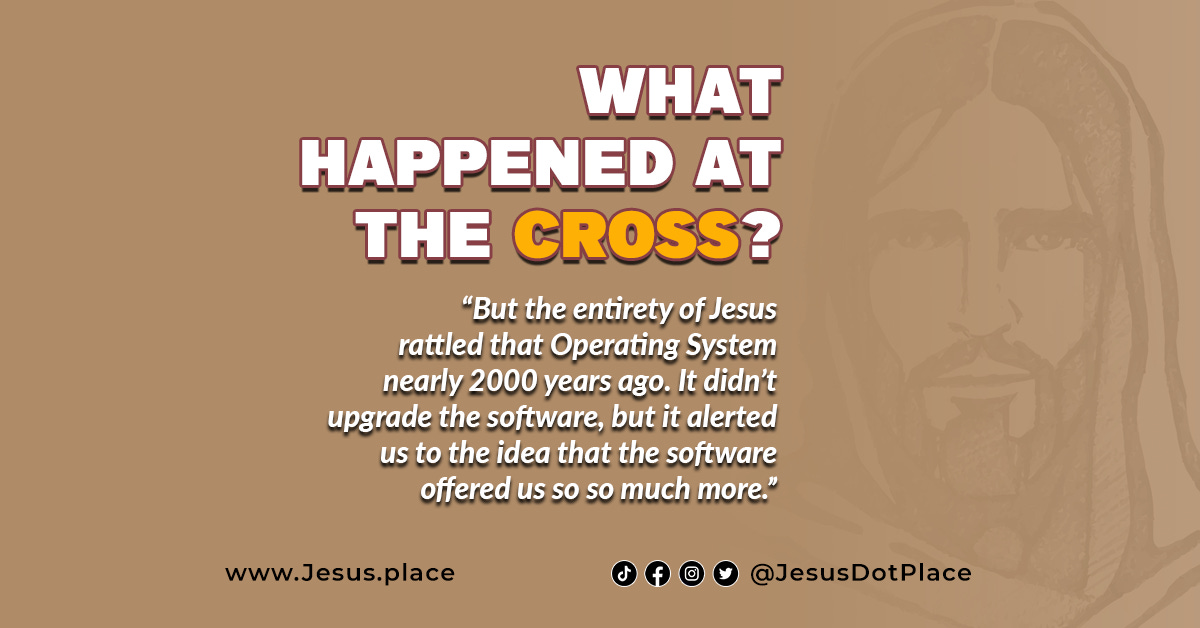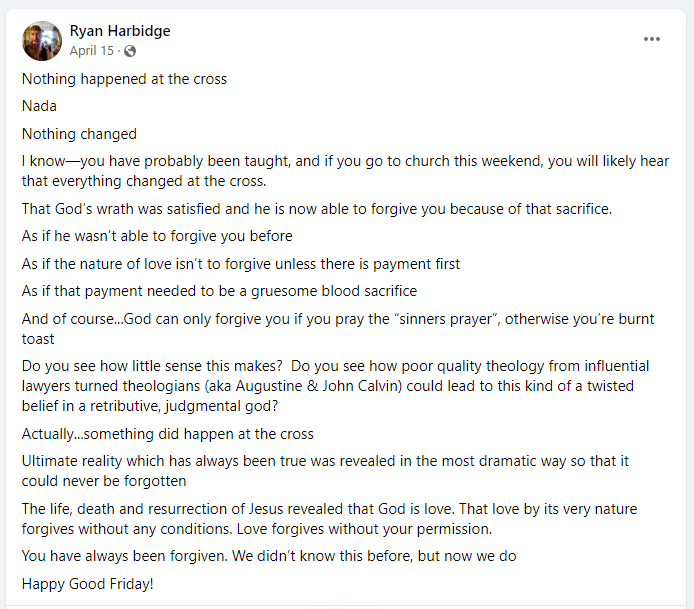What Happened At The Cross?
I came across this Facebook post on Easter weekend of 2021 and it’s a doozy. I can’t say that I agree with the author completely, but it did get me thinking.
Plus, it gives me the opportunity to discuss Atonement Theory which I believe is a core issue that separates denominations and colors Christians’ picture of God.
So let’s get to it.
I think Ryan, the author, is pointing out that he doesn’t believe that there is a “mechanism” that is triggered at the cross. And though I know that Ryan doesn’t believe this, his theory could be easily construed that the author is saying that Jesus died for nothing!
Jesus’ crucifixion is central to Christian theology regarding the reconciliation of man with God. Jesus is atoning for the sin of mankind by allowing Himself to be a living sacrifice at the cross.
What pastors and theologians disagree on are the “how and why” this atonement is achieved. As such, we have number of competing Atonement theories in Christianity.
Thousands of words have been written about the different Atonement theories, so for time’s sake, I am going to give some short summaries and link to the Atonement page on Theopedia. There are additional theories, but these are the main ones.
Recapitulation Theory: associated with Irenaeus (125-202), an Early Church Father, this theory sees Christ as reversing mankind from disobedience to obedience with obedience all the way to death on the cross.
Ransom Theory: usually associated with Origen (185-253), another Early Church Father, this theory has Christ offered as a ransom, usually paid to Satan, to buy back mankind. Popular thru the 11th Century.
Satisfaction Theory: credited to Anselm (1034-1109), a medieval theologian, this theory has Jesus dying to settle a debt with God.
Moral Influence Theory: credited to French theologian/philosopher Abelard (1079-1142), this theory has Jesus’ death as a catalyst to influence mankind to improvement.
Penal Substitution Theory, credited to the Protestant Reformers of the 16th Century, this theory builds on Anselm’s to have Jesus taking God’s punishment for the sins of mankind.
Governmental Theory: credited to Hugo Grotius (1583-1645) a Dutch theologian, this theory has God punishing his own Son to demonstrate His displeasure with the sin of mankind.
Christus Victor Theory: credited to Gustaf Aulen (1879-1978) the Bishop of Strängnäs in Sweden, this theory proposes a divine conflict between God and Satan where Christ liberates humanity from the bondage of sin.
At best, I think Ryan’s theory would fall in under Moral Influence Theory although that isn’t a perfect fit. Both view the Crucifixion as demonstration or revelation rather than a mechanism. Governmental theory doesn’t have a mechanism either, but it would contrast with Ryan’s take on love.
I don’t see it as a fit for Irenaeus’ Recapitulation theory, definitely is in opposition to Origen’s Ransom theory, and HIGHLY controversial in relation to Anselm’s Satisfaction theory and Reform’s Penal Substitution theory. I’m more of a Christus Victor guy, but this theory doesn’t play nice with that either.
I’m not sold on the lack of mechanism, but having mulled this over, here is how I would try to sell this theory if I had to defend it.
It has always puzzled me that if God is God then why couldn’t He have just dealt with the Sin problem or man’s separation from God right off the bat. Why is He holding out Jesus until the 2nd half? Jesus isn’t on some NBA minutes restriction, is He?
Ryan cuts through that by saying “you’ve always been forgiven”. This isn’t a delivery issue on God’s part, it’s a reception issue on man’s part. Which then makes sense in my mind that we have an evolution (dangerous word!) of man’s ability to receive throughout the OT till Jesus. That God is giving us the ability to do trial and error so that when we get to Jesus that mankind has the experience to accept forgiveness.
But as history shows, mankind didn’t have the experience to fully accept that forgiveness and a challenged religious institution (2nd Temple Judaism) strikes back and crucified the Messiah. So come to think of it, this has an aspect of Rene Girard’s Scapegoat theory.
(NOTE: this is not an anti-Semitic screed. I think any religious institution would have responded in the same way. I think 21st Century Christianity might regard the 2nd Coming in the same manner. There…I’ve pissed everyone off!).
God, though, had foreseen this, and we have the Resurrection! Love does triumph fully in the end!
And if I may try to wrap my head around Ryan’s idea that there is no mechanism; nothing is set into motion with either the Crucifixion or the Resurrection. But the Incarnation, the Crucifixion, and the Resurrection is God’s absolute proof of His love for us from the beginning and our ability to live in relationship with Him has always been available via the power of love. Its not a mechanism; it’s a proof!
So to revisit the question: did Jesus die for nothing? ABSOLUTELY NOT! His life, His death, and His triumph over death; the entirety of Jesus SCREAMS that “I have always loved you, I will always love you, and nothing can sever Our relationship!”
Of course, we are blinded by our sinful nature. It’s as if when being hardwired for Free Will that our propensity for Sin (to miss the mark of connecting with God) came installed as well. It’s a feature of our Operating System. Maybe its what makes living life so interesting. I don’t know.
But the entirety of Jesus rattled that Operating System nearly 2000 years ago. It didn’t upgrade the software, but it alerted us to the idea that the software offered us so so much more.
We just can’t allow ourselves to see it fully. We can handle glimpses like sneaking a gaze into the Summer Sun, but that’s all we dare.
As C.S. Lewis once said “It would seem that Our Lord finds our desires not too strong, but too weak. We are half-hearted creatures, fooling about with drink and sex and ambition when infinite joy is offered us, like an ignorant child who wants to go on making mud pies in a slum because he cannot imagine what is meant by the offer of a holiday at the sea. We are far too easily pleased.”
I’m not sold on abandoning Christus Victor, but if I could have a mechanism for defeating Satan, I’m onboard for the rest of my defense of Ryan’s interesting theory. I love coming across these ideas because it reminds me that I can feel the sea breeze intensifying as I walk slowly thru the mud and out of the slum.



